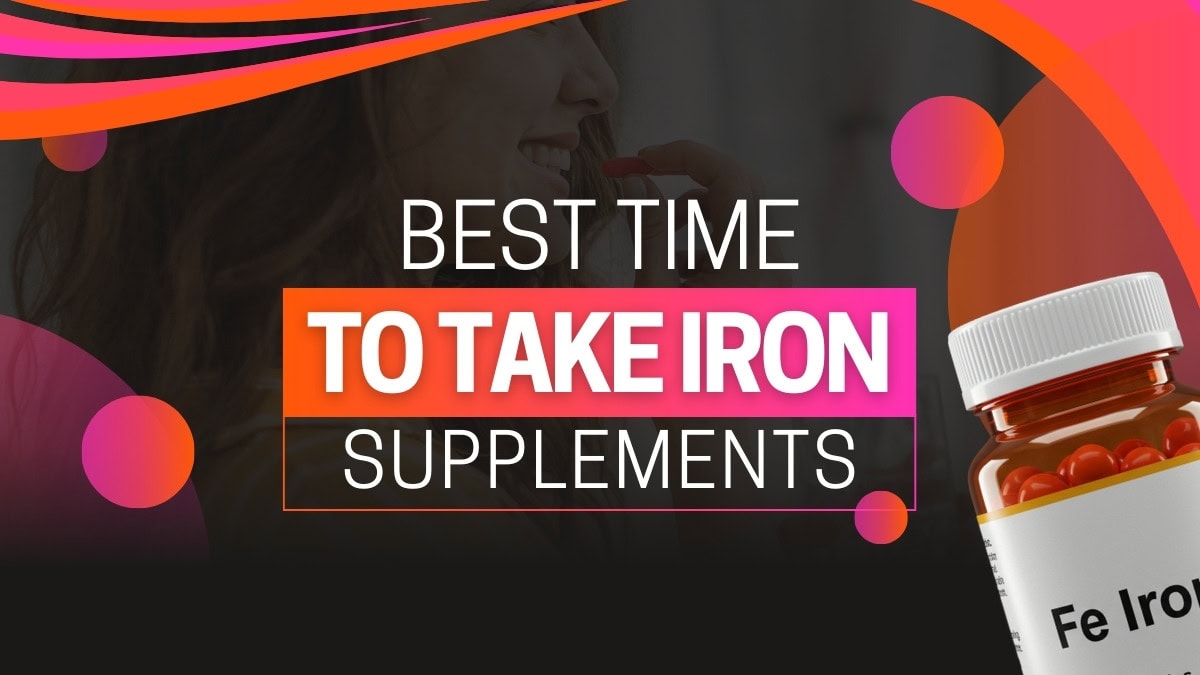
For generations, doctors have prescribed iron supplements to treat chronic fatigue and weakness, and for good reason. Iron is a vital nutrient involved in the production of hemoglobin, the protein in red blood cells responsible for carrying oxygen throughout the body.
Without enough iron, your body can’t oxygenate tissues effectively, leading to anemia, a condition that leaves you feeling constantly tired and run-down.
In this article, we’ll explore the best time to take iron supplements and explain why timing matters, so you can maximize the benefits and support your overall health.
When Is the Best Time To Take Iron Supplements
There is a best time for planting and harvesting to get the most out of your flowers, plants, and crops, so wouldn’t it seem logical that there would be an optimum time to put nutrients in your body?
Empty Stomach vs With Food
Iron is generally better absorbed when taken on an empty stomach, usually an hour before a meal or two or more hours after. If you experience any type of upset taking iron on an empty stomach, it is recommended to take it with a little bit of food or drink to help soothe digestion.
Morning vs Evening
Is it better to take iron supplements in the morning or at night? The best time to take iron supplements is in the morning to help facilitate absorption.
Since iron deficiency can also cause insomnia, taking iron in the morning will further ensure you have adequate levels in the evening so your sleep won’t be affected.
With or Without Vitamin C
Nutritional experts recommend taking iron in the morning with a food or beverage rich in ascorbic acid (vitamin C) to better facilitate absorption [1].
Types of Iron Supplements
There are numerous types of iron supplements. These are some of the most well-known:
- Ferrous Sulfate: One of the most common forms, it is inexpensive and found in many commercially sold supplements.
- Ferrous Gluconate: This type is easier to tolerate and is one of the most absorbable forms available.
- Ferrous Fumarate: This type contains a high percentage of elemental iron, making it a very potent choice.
- Ferrous Bisglycinate: This is a chelated form of iron that is easily absorbable and has minimal side effects.
Heme vs Non-heme Iron
Heme iron is found in animal products, while non-heme iron is found in plant sources and iron-rich foods. Heme iron is generally more absorbable than non-heme iron.
Prescription Iron vs Over-the-Counter Options
Iron by prescription usually comes in higher doses and is used to treat specific conditions, like severe iron deficiency. Over-the-counter options are less expensive, easier to obtain, and designed for mild conditions of fatigue due to low iron levels.
Why Is Iron Important?
Iron is a nutrient that is involved in many bodily processes. For instance, it is involved in the formation of hemoglobin. This mechanism transports oxygen throughout the body. Energy production and various metabolic processes like DNA synthesis and hormone production require iron, too.
Studies on the role of iron in brain development show that iron also plays a big role in the neurological and physical development of children, contributing to the formation of healthy hair, skin, and nails.
What To Avoid When Taking Iron
If you’re taking iron, some of the foods that can interfere with its absorption are dairy products like cow milk and foods high in oxalates and phytates, such as dark, leafy greens, beans, nuts, and grains. Caffeine can also hinder iron absorption along with medications like antacids, and some antibiotics like tetracycline.
It’s crucial to maintain healthy iron or ferritin levels, as these indicate your stored iron, and deficiencies can occur due to factors like inadequate intake or blood loss. While avoiding inhibitors is key for absorption, it’s also crucial to prevent iron overload, which can have negative health consequences.
Tips for Maximizing Iron Absorption
Iron can be a tricky nutrient to get your body to take. Here are some tips for getting the most from your iron supplement.
Pairing Iron With the Right Foods
Every time you take iron is the best time to take iron and vitamin C. That’s because the ascorbic acid in vitamin C greatly enhances iron absorption, particularly with non-heme iron sources. Any foods rich in vitamin C, like orange juice and other citrus fruits, are great to have with iron.
Anytime you use iron supplements is also the best time to take iron and vitamin D. The same goes for vitamins A and beta-carotene. Foods rich in these nutrients, like mushrooms, liver, and fish, as well as carrots, sweet potatoes, and red peppers, will all help your iron absorption.
Timing Around Meals
It is preferable to take iron on an empty stomach. This means the best time of day to take iron supplements is in the morning, 1-2 hours before your breakfast, to optimize absorption within the gastrointestinal tract.
However, this can sometimes lead to an upset stomach in some people and is a particular concern for pregnant women and older adults, who may experience more pronounced gastrointestinal side effects.
Maintaining a Consistent Schedule
Studies suggest that taking iron consistently in the morning when hepcidin levels are low is optimum. Hepcidin is a hormone in the liver that regulates iron absorption [2].
Alternate-day dosing is another way to take advantage of low hepcidin levels to aid absorption. This means taking a double dose of iron every other day rather than a single dose per day [3].
When To Talk To a Doctor
Talking with your healthcare provider is important before taking any supplement, but especially regarding the best time to take iron supplements.
For example, if iron supplements are not working, or you are experiencing side effects from taking iron or have a suspected iron deficiency, your doctor can help sort things out and get you on the proper dosage.
Likewise, concerns about any underlying health condition, medication interactions, or even the best time to take iron tablets during pregnancy to avoid vomiting will all benefit from your doctor’s knowledge and training.
Expert Insights
According to the National Institutes of Health, iron is something our bodies need to function properly, it is also something our bodies can’t produce on their own. This means all the iron we depend on to survive must come from outside sources.
When your body is denied a sufficient amount of iron, you not only run the risk of becoming very sick, but you can also die. Iron deficiency anemia can cause organ failure, heart failure, and stroke. Therefore, it is important to become familiar with the symptoms of iron deficiency, such as fatigue, shortness of breath, pale skin, and dizziness [4].
FAQs
Here are some questions readers have been asking about the best time to take iron supplements.
When Should I Take Iron, Morning or Night?
You should generally take iron in the morning on an empty stomach to aid absorption and avoid any upset when the stomach is less active.
What To Avoid When Taking Iron Pills?
When taking iron pills, some things to avoid are caffeine (tea or coffee), milk, antacids, and antibiotic medications. That said, having a consistent exercise plan like VShred can support your overall health and well-being, which is important when addressing iron deficiency.
Is It Better To Take Iron on a Full or Empty Stomach?
It is better to take ferrous iron, the form of iron most readily absorbed by the body, on an empty stomach to help aid in its absorption.
What Interferes With Iron Absorption?
There are several dietary inhibitors to iron absorption, like phytates found in grains and legumes, polyphenols in tea, coffee, and wine, calcium from dairy sources, and soy products. Age, infections, and medications can also inhibit iron absorption. When joining a diet program, consider these inhibitors and focus on iron-rich foods alongside enhancers like vitamin C.
Best Time To Take Iron Supplements: Conclusion
Hopefully, this article has shown you not only the best time to take iron supplements but also how important iron is for optimum health and how sick you can get if you’re iron deficient.
As always, make sure to consult with your doctor before taking any supplements. Especially if you’re pregnant, breastfeeding, have a diagnosed medical condition, or if you’re already taking any prescription medications.
Good luck and good health.
 11 Niche Experts
11 Niche Experts
 100+ Product Reviews
100+ Product Reviews
 50+ Tested Products
50+ Tested Products
At BestDaily, our mission is simple: to help you make confident, informed decisions about the products that impact your daily life. Whether you're searching for wellness essentials or lifestyle upgrades, we combine hands-on testing with expert analysis to highlight what truly works.

